Reports
In 2015, CBAN embarked on a major investigation of the impacts and risks of genetically modified organisms (GMOs) after twenty years in Canada. Our GMO Inquiry reports are all accompanied by summary pamphlets that you can also download. Find them below or visit the GMO Inquiry project website. 
Gene-Edited Fruits and Vegetables in Canada
October 2025. This report focuses on genetically engineered (genetically modified or GM) fruits and vegetables. It profiles the three GM fruits and vegetables on the market in Canada, three new GM whole foods that could soon be introduced, and three prominent GM products that are not yet on the market despite many years of promotion.
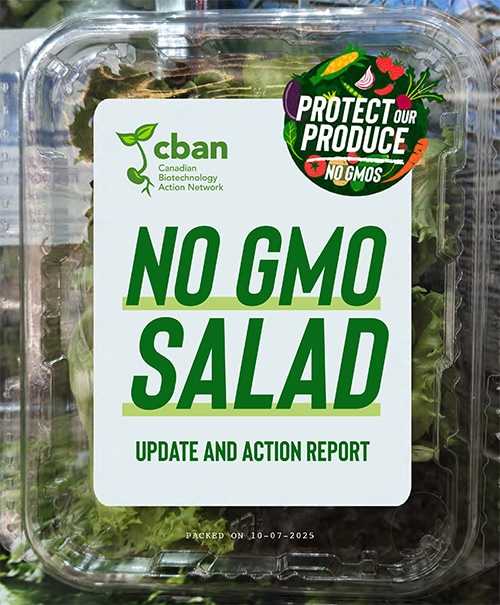
No GMO Salad Updates and Action Report
June 2025: GM gene-edited greens are not yet in grocery stores in Canada and most major packaged greens brands in Canadian grocery stores have non-GM commitments or offer a certified organic option. In October 2024, Bayer was preparing to launch GM gene-edited salad greens but now says it has no target date for release in Canada. However, Bayer continues to promote gene-edited greens and other GM fruits and vegetables on social media.
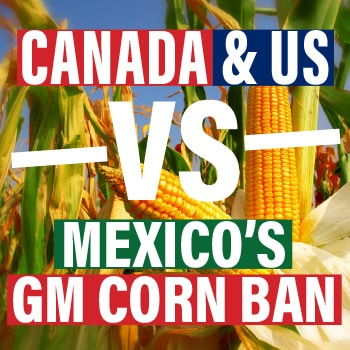
Response to Canada’s Arguments Against Mexico’s GM Corn Restrictions
April 2024. On April 5, the Government of Canada’s submission to a trade dispute panel was published, arguing against Mexico’s restrictions on genetically modified (GM) corn. CBAN's response includes discussion of GM corn risks.

Canada & US vs. Mexico’s Ban on GM Corn
January 29, 2024. Canada and the US are using the Canada-US-Mexico trade agreement (CUSMA) to challenge Mexico’s new ban on genetically engineered (genetically modified or GM) corn. Canada does not export any corn to Mexico, but the Government of Canada is participating in a trade dispute to force open the Mexican market.
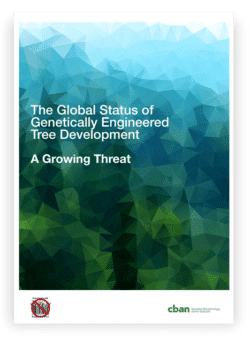
The Global Status of Genetically Engineered Tree Development: A Growing Threat.
September 2022. The global release of genetically engineered trees is closer than it has ever been. Due to changes in national regulations, this report may be the last opportunity to get a snapshot of GE tree field testing around the world.
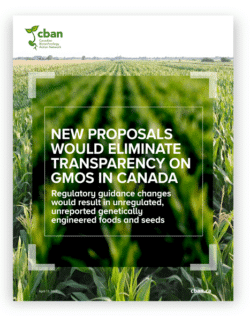
New proposals would eliminate transparency on GMOs in Canada
April 2022. Health Canada and the CFIA are proposing to remove government regulation for many new GMOs produced using the new genetic engineering techniques of genome editing (also called gene editing). If allowed to move forward, these changes would result in a profound lack of transparency on genetically engineered foods and seeds for Canadians.
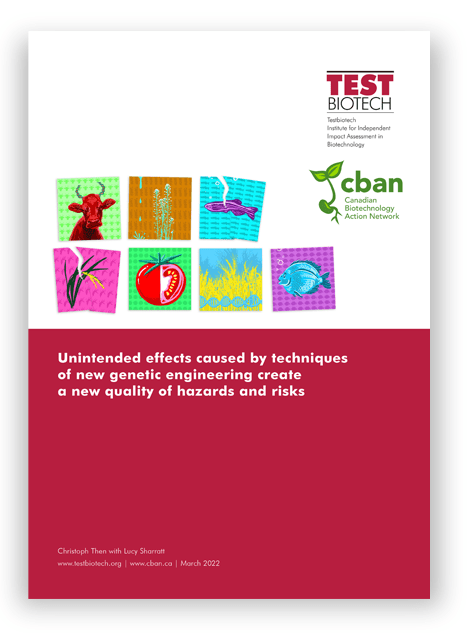
Unintended effects caused by techniques of new genetic engineering create a new quality of hazards and risk
March 24, 2022. A report from Testbiotech (Germany) and the Canadian Biotechnology Action Network (CBAN) discusses the scientific literature that shows the basic differences between plant breeding and genetic engineering, and argues that these differences need to be considered in regulation.
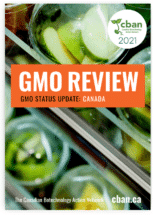
GMO Review
November 30, 2021. This GMO Review is a snapshot of the most up-to-date information on genetically modified organisms (GMOs) in Canada. Follow the links on each page for more in-depth information on that topic and to take action.
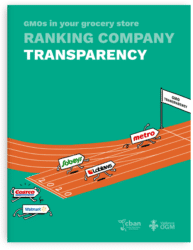
GMOs in your grocery store: Ranking company transparency
December 2020. This report provides information to Canadians about genetically modified organisms (GMOs) on the market and, in particular, the status of whole GM foods – fruits, vegetables, and fish – in Canada’s largest grocery chains. The report ranks Canada’s major grocery chains for their transparency about sales of genetically modified fruits and vegetables, and the GM salmon.
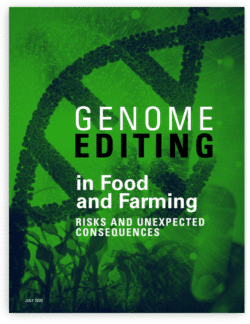
Genome Editing in Food and Farming: Risks and Unexpected Consequences
July 2020. The report provides an overview of the new genetic engineering techniques of genome editing that are being explored in agriculture, and the range of risks and potential unexpected consequences that can arise from them. The purpose of our report is to support public discussions about the possible implications of using genetic engineering in food and farming.
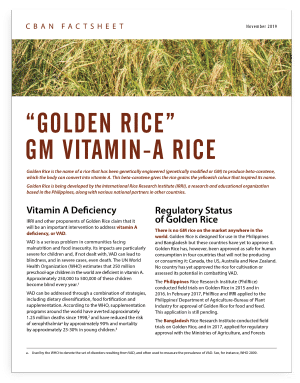
“Golden Rice” – GM Vitamin-A Rice
November 2019: This report is a comprehensive examination of “Golden Rice”, so named because it has been genetically modified to produce betacarotene, which the body can convert into vitamin A. Golden Rice is being promoted as a solution to the serious problem of vitamin A deficiency (VAD) in countries such as the Philippines and Bangladesh but it is not yet ready for farmers to grow or for people to eat, its beta carotene levels are low, it does not store well, and we still do not know whether it helps fight VAD. Golden Rice is expensive, unnecessary, and does not address the real problem.
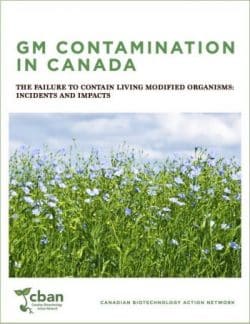
GM Contamination in Canada: The failure to contain living modified organisms – Incidents and impacts
March 26, 2019. This report documents in one place, for the first time, GM escape and contamination incidents that have occurred in Canada. These experiences provide lessons that need to be evaluated and understood before any more genetically modified organisms are released.
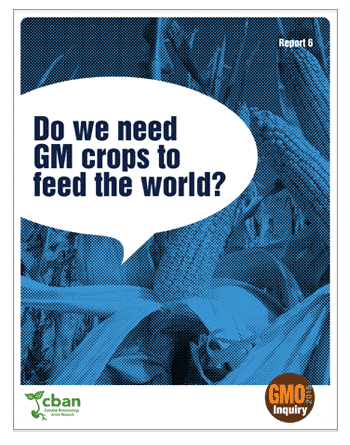
GMO Inquiry: Do We Need GM Crops to Feed the World?
This sixth and final report of our GMO Inquiry examines the question “Do we need GM crops to feed the world?” We conclude that, while the argument that this technology can solve the problem of world hunger, or be a tool towards ending hunger, is compelling, it is in fact false. The report includes information from the five other reports of the GMO Inquiry, published over the course of 2015. The research in this report begins to look ahead to understand what role – if any – GM crops and foods should play in the future of our food and farming systems.
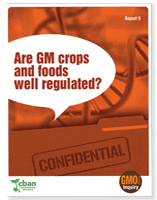
GMO Inquiry: Are GM Crops and Foods Well Regulated?
This report examines how deeply untransparent Canada’s regulation of GMOs, even today. Despite twenty years of critique, Canada’s safety assessment of genetically modified (GM) foods, crops and animals is still a closed-door process that is based on information provided by industry – information that is kept confidential and not disclosed to the public or independent scientists.
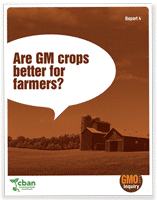
GMO Inquiry: Are GM Crops Better for Farmers?
This report in the GMO Inquiry investigates the impacts of genetically modified crops on farmers in Canada. Have GM crops benefited farmers? Have they increased yields and farm incomes? What are the costs of herbicide-resistant weeds and GM contamination for farmers?
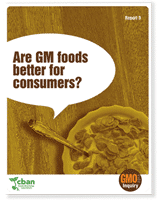
GMO Inquiry: Are GM Foods Better for Consumers?
This third report in the GMO Inquiry examines the question of benefits for the “consumer” and examines the state of the scientific literature on human health safety questions. The report also discusses the answer to the question Why aren’t they labeled? Genetically modified foods were allowed onto grocery store shelves in Canada without labels, without meaningful public debate, without government testing, and without long-term animal feeding studies.
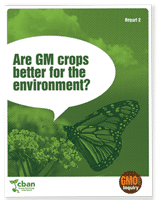
GMO Inquiry: Are GM Crops Better for the Environment?
In this second report of the GMO Inquiry 2015, we investigate the impacts and risks of genetically modified organisms (GMOs) on our environment. Genetically modified crops have been a 20-year open-air experiment in Canada. What are the consequences?
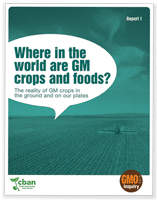
GMO Inquiry: Where in the World are GM Crops and Foods?
In this first report of the GMO Inquiry 2015, we show what genetically modified (GM) crops are grown in Canada and around the world, where they are being grown, how much of each one is being grown, and where they end up in our food system. The Canadian government does not track this information, but we have investigated. Industry promotional materials commonly depict genetically modified crops being grown widely around the world, but this is not entirely true. In reality, four crops – corn, soy, cotton and canola – account for 99% of global GM acres.
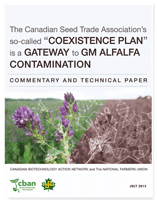
The Canadian Seed Trade Association’s so-called “Coexistence Plan” is a gateway to GM alfalfa contamination
This 2013 Commentary and Technical Paper from CBAN and the National Farmers Union critiques the Canadian Seed Trade Association’s “coexistence plan,” designed to pave the way for Monsanto and Forage Genetics International to release genetically engineered alfalfa in Eastern Canada. The Eastern Plan as well as a Western Plan have since been finalized and very small amounts of GM alfalfa were planted in Eastern Canada in 2016 for the first time, but this analysis remains highly relevant.
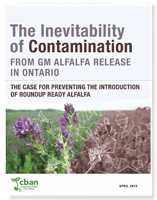
The Inevitability of Contamination from GM Alfalfa Release in Ontario
This 2013 report from CBAN presents a detailed overview of the many potential means by which GM alfalfa will contaminate non-GM alfalfa and hay crops, if it is released in Ontario. The biological characteristics of alfalfa conspire to present a particularly potent risk of gene escape.





